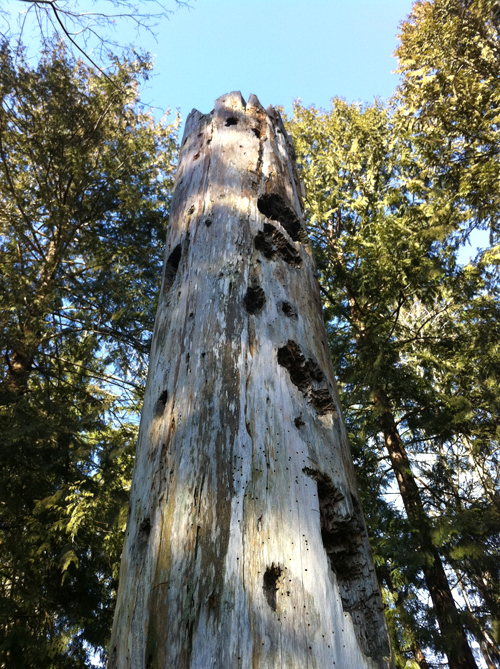
pausing the sound of waves sighing, birds humming the tune of spring in winter
i walk seeing the world of the park in poetry
carved bare, a fallen tree is alternately caressed and whipped by the water where it sits
as i sit the late january sun lays its blanket on one side of my face,
the cool wind gently breathing on the other
dichotomy
one day that moss will break down the rock under its clinging feet
the tree bridge will sink into the earth, a nurse log
for future cedars
 This daily green blog is in support of David Suzuki’s 75th birthday fundraising campaign put on by the David Suzuki Foundation. Please help me out by sponsoring me online now.
This daily green blog is in support of David Suzuki’s 75th birthday fundraising campaign put on by the David Suzuki Foundation. Please help me out by sponsoring me online now.
Note: I am writing solely on my own behalf, and do not claim to represent the David Suzuki Foundation or its views here.
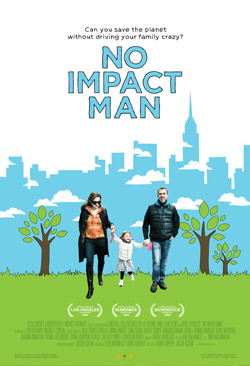
It’s a familiar pattern now: Alisa Smith and James MacKinnon ate locally for a year and wrote a book about it; Jen and Grant went zero-waste for a year, blogged and filmed a documentary about it. If doing either of those things doesn’t seem crazy and transformative enough, Colin Beavan’s family of three did both for a year, and turned off their electricity (for 6 months), self-powered their transportation, went vegetarian and stopped using toilet paper. The project, No Impact Man, is a film, a book and a blog about eliminating one’s personal impact on the environment.
The point of doing something this extreme, he cautioned, was not to suggest that everyone do it, but that everyone can do something. Individual actions, he says, inspire and engage others to act. That’s the power of community, something he says has eroded. It’s also a challenge to us to consider what really is necessary for daily life and what we could do without. As Colin puts it, living with a low impact is about “doing more good than harm.” At the end of their year, Colin’s wife Michelle decided she’d like to keep cycling (something she’d never have considered a year earlier) and not bring back their TV — except on vacation.
Continue reading Film review: No Impact Man »
I had an interesting time at Metrotown on Friday. Rows upon rows of sequined plastic iPhone cases, “50/50” t-shirts at American Apparel as if 50% polyester were a selling point, fluorescent Nikes, fake culture at Chapters induced by jazz at Starbucks, and dangerous high-heeled shoes left me feeling disconnected and a little cynical. I grew up being called weird, but looking around at this highly materialistic, throw-away, plastic culture truly made me feel weird and unable to understand its fads.
The food services produce disposable dining ware (read: garbage), poor quality food and a shockingly large crowd at McDonald’s. As my friend jokingly suggested sharing a $1.39 recipe-for-bloating, I stood there waffling between despair and a holier-than-thou attitude. I’ve become so distanced from that 12-hour a day, 7-days-a-week consumerist culture that being surrounded by it leaves me shell-shocked.
Continue reading The other 20 percent »
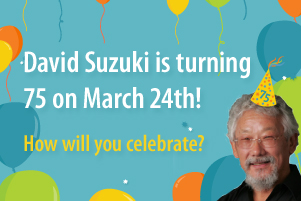 David Suzuki is turning 75 on March 24. To celebrate this momentous occasion and honour his life’s work, the David Suzuki Foundation invites you to make a gift or fundraise online to support the Foundation’s work, and send a personal message to David. There are prizes involved, and those coaxed me into signing up.
David Suzuki is turning 75 on March 24. To celebrate this momentous occasion and honour his life’s work, the David Suzuki Foundation invites you to make a gift or fundraise online to support the Foundation’s work, and send a personal message to David. There are prizes involved, and those coaxed me into signing up.
But I was at a loss for what pledge to make in return for my friends’ generosity. Jenny has pledged to bike the 60+ km round trip to work and back. Siri has promised to avoid shopping sprees until the big day. It got me thinking about what change for the greener I could make, and it wasn’t easy coming up with something — not because I’m unwilling to make lifestyle changes, but because I’ve made so many that I was struggling to find something new. I know my showers could be shorter and I really ought to shut down my old iMac hog at night. I’ll come around to a permanent commitment to those eventually. I eat four or five bananas a week, my cheese comes wrapped in plastic (I eat a lot of cheese) and I’m kind of addicted to the internet. (Just kind of.) I could change one of those for a little while, no big loss for a little bit of gain. But this isn’t about guilt, it’s about inspiring people and doing something meaningful. First, though, I have to inspire myself.
So I’m going to write a blog post about the environment every day until I reach my fundraising goal of $300. Just look at my sporadic track record: I’m going to need all the moral support I can get!
I may get carpal tunnel, avoid social occasions and frequently skip flossing in order to keep this up — but it’s David’s 75th and I believe very strongly in the work he and his Foundation does.
Will you celebrate with me? Here’s how:
1) Sponsor me online. (Two donors have pledged to match the first $15,000 raised in the campaign, so you’ll essentially be doubling your donation.)
2) Write a birthday message to David.*
3) Look for your personal message to be displayed at HappyBirthdayDavidSuzuki.com within a couple business days of your submission.
I invite you to join me and write your own blog post or comment here about what you’re doing for the environment and why. Or conversely, if you’re not doing anything, why not? I won’t guilt trip you; I’m seeking to understand. Also, if you’d like to request an eco topic about which you’re yearning to know more, leave a comment and I’ll consider it for a future post.
Thank you in advance for supporting the cause that is so very dear to my heart, and valuable to the majority of Canadians.
* It’s easy to donate online at HappyBirthdayDavidSuzuki.com. To send David a message without donating, write to contact@davidsuzuki.org.

My bathroom shelf: Toothpaste, coconut oil, shea butter, oregano oil, floss and deodorant
Let’s face it: women use more products than men, and we have a recurring, generally very wasteful (but otherwise healthy) function that they don’t have. But this doesn’t mean we need to create more garbage than these low-maintenance dudes. If you live in Metro Vancouver, you’ve seen the ads, you’ve seen the news. We create a lot of garbage, and we can’t throw it on Cache Creek forever. Our rubbish has to go somewhere, so it’s time to try harder to avoid creating it in the first place. (It’s reduce, reuse, recycle, remember.) But you’re a girl, and you have needs. Now what?
Simple.
1. Get an “eco positive period“ with the Diva Cup and a combination of smart panties and reusable cloth liners and pads. The fabrics are organic cotton and the Diva Cup merely collects your flow, so you can avoid nasty things like toxic shock syndrome and yeast infections. Other benefits? No smelly waste, no crinkly noises from plastic pads, no discomfort, and no worries about running out. Yes, it can be discreet, super fun, and still feel sexy. It will simply make your life easier, save you money and time in the long run, and reduce your footprint on the planet big time. If you’re still not convinced, read their testimonials and their tips. Lunapads is based in Vancouver. Hint: sign up for their newsletter and grab the Green Zebra coupon book to save some dough.
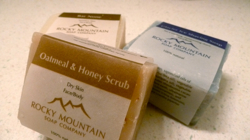 2. Happy soap! If you’re not into making your own, skip the shrinkwrap, the toxins and the plastic pumps with Rocky Mountain Soap Company‘s earth-friendly bar soap, wrapped in just a strip of paper. (Mountain Sky is another option.) They also sell a shaving* soap bar. I know you think you need foam to shave, but I dare you to try this stuff for a month and see the difference. I used to use bar soap that wasn’t even meant for shaving, then tried a foam cream in an aerosol can (what was I thinking?!). Rocky Mountain wins hands down. Their Vancouver store is on Granville & 15th, and they sell unscented soap too.
2. Happy soap! If you’re not into making your own, skip the shrinkwrap, the toxins and the plastic pumps with Rocky Mountain Soap Company‘s earth-friendly bar soap, wrapped in just a strip of paper. (Mountain Sky is another option.) They also sell a shaving* soap bar. I know you think you need foam to shave, but I dare you to try this stuff for a month and see the difference. I used to use bar soap that wasn’t even meant for shaving, then tried a foam cream in an aerosol can (what was I thinking?!). Rocky Mountain wins hands down. Their Vancouver store is on Granville & 15th, and they sell unscented soap too.
Continue reading 7 simple ways to reduce bathroom waste »
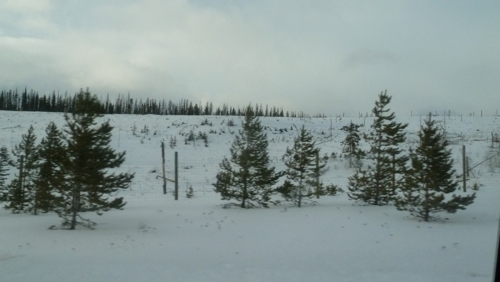
Snow on logged forest next to the Coquihalla in December
I’ve been meaning for some days to write a year-end blog post for 2010, but I’ve been too busy doing a New Year-inspired purge of things like old phone bills, unread newspapers, and other mainly paper-based ephemera. When I considered with a week left of holidays what things I’d been meaning to do at home for ages, I drew up a pretty long list. Of course, writing a blog post was on it, but when I settle into a rare purging and organising mindset, this nostalgic pack rat has to finish the job with swift, devoted action. So here it is, a bit late.
Continue reading 2010’s troubles and triumphs »
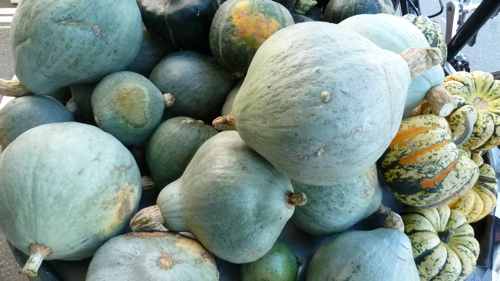
Monoculture, by its very nature (pardon the ironic pun), is not a resilient agricultural system to begin with. More susceptible to disease because of genetic similarity, and terrible for soil health, it’s a venture with growing risks that are starting to outweigh its purported benefits. A new study is warning its lack of genetic diversity puts it at risk from a new enemy that doesn’t discriminate like fungus or insects do: climate change.
If the current reports of species loss around the globe isn’t already freaking you out, taste this:
The genetic diversity of the plants that we grow and eat could be lost forever due to climate change, threatening future food security, the UN’s Food and Agricultural Organization (FAO) said on Tuesday.
Experts from the Rome-based organization warned that the loss of biodiversity will have a major impact on humankind’s ability to feed itself in the future as the global population continues to rise to nine billion by 2050.
“There are thousands of wild crop relatives that … hold genetic secrets that enable them to resist heat, droughts, salinity, floods and pests,” FAO director general Jacques Diouf was quoted in the report as saying.
“Increasing the sustainable use of plant diversity could be the main key for addressing risks to genetic resources for agriculture,” he said. (Vancouver Sun)
Continue reading Why we need biodiversity, not monoculture »
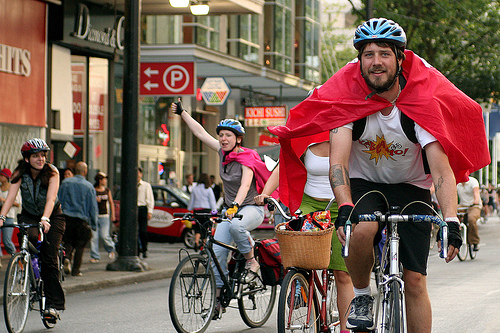
Cyclists on Robson St. Photo by cabbit via Flickr.
As Vancouver’s City Hall proposes another separated bike lane, this time on Hornby Street which currently has just a regular bike lane, the usual bike vs. car debate fires up again. I don’t see it as a choice of one over the other; we all have to get along. But as a cycling advocate and addict (and the daughter of another — I like to joke that my father was practically born on two wheels), I’d like to share some ways in which bikes make our city a better place, without getting too much into the anti-car realm here. Certainly thinking of these benefits makes me even more resistant to ever using my driver’s license for its primary purpose. The last time I used it was to hand it over so I could test ride a bike!
1. Bikes are the ultimate zero-emission vehicle.
I think we all understand that clean air is vital. Cycling contributes to cleaner air by taking pollution-emitting vehicles off the road. Having fewer cars on the road results in less traffic congestion, which should in turn reduce pollution further. Because bikes require no fossil fuels to operate (let’s not get into a debate over what fuels the human because everyone eats regardless of their mode), there is reduced strain on our non-renewable resources. We all know oil extraction has catastrophic environmental impacts even without oil spills.
Bikes are extremely efficient and use less materials. On the other hand, “These 1,300-kilogram metal boxes carry on average one-and-a-half people, approximately 130 kilos — a mere 10 per cent of the vehicle’s weight” (Yves Engler, The Mark) and require 1,860 calories per mile, compared to 35 for a bicycle, according to the WorldWatch Institute.
2. Bikes take up less space.
Whether they’re parked in an apartment or on the street, riding on the road or a trail, bikes require less physical space than cars. And when you have more space available, this makes room for more useful and pleasant aspects of a city: restaurant patios, parks, street food, community gardens, street performers, art installations, and so on. A parking space is private space, not public, when a car is on it.
Continue reading Why bikes are good for Vancouver »
I realised when I left Pecha Kucha (at the gorgeously renovated Queen Elizabeth Theatre), in a hurry to catch my 10:20 bus, that I don’t have enough conversations with people about sustainability. I attend events where the hundreds or thousands of people in the room/theatre all have a common interest, yet I go there to absorb information, chat with friends and promptly leave. I can’t blame all of that on living in the suburbs with a typically once-per-half-hour bus. But ultimately the result is that the information I gleaned and my opinions remain for the most part locked in my head and I lose the opportunity to learn from others in my community. (And Vancouver being a small city nurses an intimate though often disconnected one.)
Dialogue takes place frequently online, but in my experience it tends to be short and superficial and, while offering participation theoretically to anyone, the reality is that many voices are left out even within our own city. That’s where dialogue in person can facilitate those deeper connections that might not otherwise be made. It also lets us communicate visually. (And with that, check out RangiChangi Roots.) An event like Pecha Kucha is available to anyone with $10 and a couple hours to spare. It won’t reach everyone, but advertising in offline and particularly free media such as the Georgia Straight (I’m not sure whether it made it to street poles) pushes its reach outside of the—to some degree—exclusive online world. Over 2000 people attended Wednesday’s event, a specially-themed “Walk the Talk, Green Your City”, which is terrifically encouraging.
Continue reading Walk the Talk, Green Your City »
It’s the day after Earth Day and I’m on my favourite North Shore bus route. Lined by trees most of the way, including a park ravaged in the windstorm of a few years ago and a protected habitat area with beautiful deciduous trees, the two-lane Dollarton Highway can feel like a backcountry road. Certainly in the rear view mirror of my bicycle it can make me pretend I’m somewhere else.
The road was realigned and widened years ago, and I still remember the disappointment and shock I felt in staring at this huge, ugly, wrecked swath where they had pummeled through what I can only assume was old-growth forest. I had forgotten the image until a reminder came today.
Developers have been clear-cutting small chunks at a time to build two-story business operations. They’re not the ugliest buildings in the world and they did a fine job of either keeping perimeter trees or replanting, which is more than I can say for most areas. It’s a beautiful road, even, as roads go with its remaining forests. I know one treed part is doomed as it has a Colliers sign on it while the trees are still standing. Today I’m distracted by writing a different blog post on my iPod. In my peripheral vision, something has changed. Massive trees and mangled branches are heaped on bare ground where a magnificent, dense group of conifers had stood untouched for decades. My heart cracks open and a knot grips my throat. I’m paralysed for a moment by an aching sadness that becomes a desire to vomit as I pass existing cleared blocks and those currently spared, beautifully lush but damaged. I am overcome; my lower lip quivers and I wonder if anyone else has noticed the abrupt change and felt similarly.
Where we have something so irreplaceable, and that defines space so dominantly, I can’t grasp why we destroy it for a mere two-story building, parking lots, a gas station, a puny Tim Hortons drive-thru. We ignore opportunities to decrease our buildings’ footprints by building them compact to begin with or replacing old single-story ones with multi-story. There’s no shortage of this activity with houses in older neighbourhoods, so why do we treat our commercial spaces differently? Why are these formerly forested areas being developed now? Does anybody give a damn?

 This daily green blog is in support of David Suzuki’s 75th birthday fundraising campaign put on by the David Suzuki Foundation. Please help me out by sponsoring me online now.
This daily green blog is in support of David Suzuki’s 75th birthday fundraising campaign put on by the David Suzuki Foundation. Please help me out by sponsoring me online now.

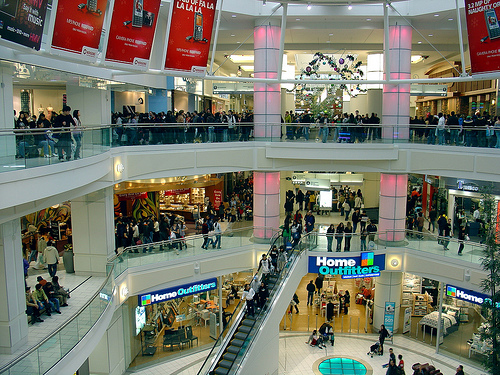 Metrotown on Boxing Day, 2006. Photo by
Metrotown on Boxing Day, 2006. Photo by 

 2. Happy soap! If you’re not into making your own, skip the shrinkwrap, the
2. Happy soap! If you’re not into making your own, skip the shrinkwrap, the 

